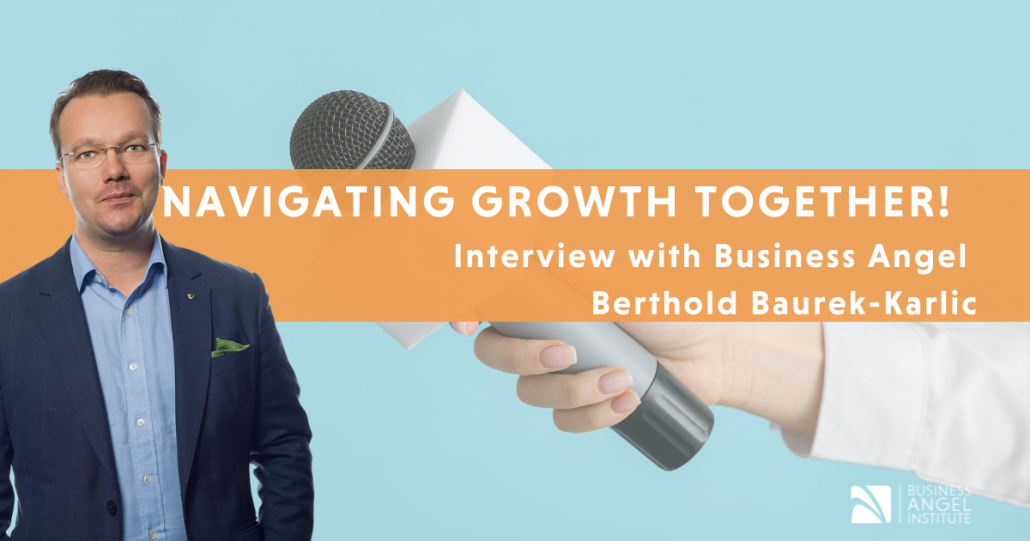We’ve interviewed our founder and General Secretary, Berthold Baurek-Karlic, and he graciously answered our questions. Read on to discover what the Business Angel of the Year 2023 in Austria has to say on the topic of “Navigating Growth Together”.
BAI: Let’s dive into the realm of Business Angels. You’ve been recognized as Austria’s Business Angel of the Year 2023, a tremendous achievement. Can you shed some light on the role of Business Angels in the startup ecosystem?
Berthold Baurek-Karlic: Absolutely. Business Angels are more than just financial backers. They are mentors, guides, and partners. Many startups possess fantastic ideas but often face the hurdle of insufficient funds to actualize these ideas. This is where Business Angels step in. They provide crucial insights, networks, and support right from the start.
BAI: So, how does one discern whether they need external financing or if “bootstrapping” would suffice?
Berthold Baurek-Karlic: That’s a significant consideration. Determining whether you need external financing or if bootstrapping is sufficient depends on various factors related to your business, its stage, financial needs, growth potential, and risk tolerance. Before reaching out to an investor or a Business Angel, founders should therefore thoroughly assess and evaluate whether external funding is genuinely necessary. Bootstrapping, or financing from one’s resources, often proves to be more lucrative in the long run for many startups. At the end of the day, the decision involves a trade-off between control, growth speed, financial risk, and resource availability.
BAI: Understood. So which factors should a founder consider when he or she thinks about external financing versus bootstrapping?
Berthold Baurek-Karlic: When contemplating external financing versus bootstrapping, key considerations include the current financial state, growth goals, and risk tolerance. Understanding if your own resources can cover costs without external funding, evaluating the stage of your business, and assessing your desire for rapid expansion versus control are crucial. Market competitiveness, resource needs, long-term plans, and the cost implications of each option also weigh in. Ultimately, it’s about balancing growth needs, risk, and resource availability to align with a founder’s business vision.
BAI: Early engagement with potential Business Angels seems crucial. Could you elaborate on the importance of this?
Berthold Baurek-Karlic: Absolutely. Early engagement with Business Angels is vital for startups, beyond mere financial backing. They provide expertise, mentorship and of course contacts to other potential investors. Their involvement or recommendation bolsters a startup’s credibility, opening doors to additional funding, partnerships, and customers Engaging with Business Angels at an early stage allows startups to tap into their expertise and networks sooner. The expansive networks they bring facilitate growth, partnerships, and also talent acquisition. The sooner they come on board, the quicker they can provide valuable insights and support.
BAI: What should startups prepare before entering into a partnership with Business Angels?
Berthold Baurek-Karlic: Beyond having a great idea, startups must organize essential documents, financial data, legalities, and a comprehensive business plan. This includes having a clear understanding of the company’s financials, projections, and any relevant market research or feasibility studies. Presenting a comprehensive and well-thought-out business plan is essential, outlining the business model, growth strategy, and potential scalability.
In addition to these tangible aspects, attention to legalities is paramount. Startups should ensure that all legal documentation, such as incorporation papers, intellectual property rights, contracts, and agreements, are in order and readily accessible for review by potential Business Angels.
Moreover, soft factors such as team dynamics and the personal attributes of team members play a significant role. Team dynamics and the personal attributes of team members are vital. Business Angels often scrutinize the team’s capabilities, assessing their experience, expertise, and commitment to ensure compatibility and resilience in the partnership. Demonstrating a cohesive and capable team can bolster confidence in the startup’s ability to execute its plans successfully.
BAI: Collaboration with Business Angels usually lasts several years. How do they support startups during this period?
Berthold Baurek-Karlic: Indeed, the collaboration spans several years, much like any business partnership. During this time, Business Angels offer extensive support to their portfolio companies, spanning financial backing, strategic guidance, helping companies navigate highs and lows, maintain direction, provide support during rough patches, and advise on critical professional matters. They offer initial funding and continue to invest as the startup grows, connecting them with potential investors. Business Angels share their vast experience, advising on business strategies, operational decisions, and risk management. Their networks open doors to partnerships, clients, and valuable resources. Drawing from industry knowledge, they offer insights into market trends and challenges, aiding informed decision-making. Business angels help streamline operations, offer access to essential resources, and guide team building. Importantly, they provide emotional encouragement, recognizing the challenges of entrepreneurship. Overall, they aim to empower startups for sustained growth and success.
Business angels often serve as the sole confidants and sounding boards for founders. At the helm of a company, it can be quite lonely. Employees look up to the founders for direction, while friends and family might skeptically question the startup’s future. It’s crucial for founders to have someone willing to lend a sympathetic ear, offering not just advice but a genuine understanding of their concerns. Sometimes, it’s simply about listening and empathizing, providing reassurance and encouragement when founders feel drained or uncertain. This role of offering emotional support and understanding is an essential and fundamental aspect of the partnership between business angels and founders.
BAI: Lastly, what advice do you have for startups conducting a background check on potential Business Angels?
Berthold Baurek-Karlic: Just as Business Angels scrutinize companies, startups must assess potential Business Angels. Fit is crucial. Firstly, I’d recommend startups to research the angel’s track record thoroughly. Look into their past investments, successes, and failures, and understand their expertise within your industry. Companies should examine references, ensure alignment between the Business Angel and the company, and ascertain that the collaboration aligns with long-term goals to avoid premature exits that might impact future investor trust.
Secondly, verifying the credibility and reputation of the business angel is essential. Check their professional background, connections, and reputation within the investment community. It’s crucial to ensure alignment in values, vision, and expectations for the partnership.
Thirdly, have open and transparent discussions. Ask about their investment strategy, their vision for your company, and what value they specifically bring beyond financial support. Assess their commitment level, availability, and willingness to offer guidance and support over the long term.
Trust and compatibility are key in this relationship, so it’s essential to take the time to assess these aspects thoroughly before entering into a partnership.
BAI: Thank you, Mr. Baurek-Karlic, for sharing your invaluable insights into the world of Business Angels and startups.
Berthold Baurek-Karlic: It was my pleasure. Thank you for having me.
If you want to learn more about how to support founders with their vision, check our our Certified Business Angel Program.



